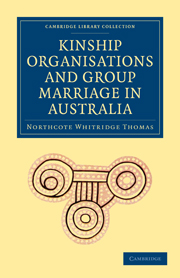Book contents
- Frontmatter
- PREFACE
- Contents
- BIBLIOGRAPHY
- INDEX TO ABBREVIATIONS
- CHAPTER I INTRODUCTORY
- CHAPTER II DESCENT
- CHAPTER III DEFINITIONS AND HISTORY
- CHAPTER IV TABLES OF CLASSES, PHRATRIES, ETC.
- CHAPTER V PHRATRY NAMES
- CHAPTER VI ORIGIN OF PHRATRIES
- CHAPTER VII CLASS NAMES
- CHAPTER VIII THEORIES OF THE ORIGIN OF CLASSES
- CHAPTER IX KINSHIP TERMS
- CHAPTER X TYPES OF SEXUAL UNIONS
- CHAPTER XI GROUP MARRIAGE AND MORGAN'S THEORIES
- CHAPTER XII GROUP MARRIAGE AND THE TERMS OF RELATIONSHIP
- CHAPTER XIII PIRRAURU
- CHAPTER XIV TEMPORARY UNIONS
- APPENDIX: ANOMALOUS MARRIAGES
- INDEX OF PHRATRY, BLOOD, AND CLASS NAMES
- INDEX OF SUBJECTS
- Plate section
CHAPTER X - TYPES OF SEXUAL UNIONS
Published online by Cambridge University Press: 05 February 2012
- Frontmatter
- PREFACE
- Contents
- BIBLIOGRAPHY
- INDEX TO ABBREVIATIONS
- CHAPTER I INTRODUCTORY
- CHAPTER II DESCENT
- CHAPTER III DEFINITIONS AND HISTORY
- CHAPTER IV TABLES OF CLASSES, PHRATRIES, ETC.
- CHAPTER V PHRATRY NAMES
- CHAPTER VI ORIGIN OF PHRATRIES
- CHAPTER VII CLASS NAMES
- CHAPTER VIII THEORIES OF THE ORIGIN OF CLASSES
- CHAPTER IX KINSHIP TERMS
- CHAPTER X TYPES OF SEXUAL UNIONS
- CHAPTER XI GROUP MARRIAGE AND MORGAN'S THEORIES
- CHAPTER XII GROUP MARRIAGE AND THE TERMS OF RELATIONSHIP
- CHAPTER XIII PIRRAURU
- CHAPTER XIV TEMPORARY UNIONS
- APPENDIX: ANOMALOUS MARRIAGES
- INDEX OF PHRATRY, BLOOD, AND CLASS NAMES
- INDEX OF SUBJECTS
- Plate section
Summary
Students of the sociology of white races enjoy conspicuous advantages over those who devote themselves to the investigation of the organisation of races in the lower stages of culture. In the first place they deal with conditions and forms with which they are personally familiar; and this familiarity is shared by those who form the audience, or the reading public, of these investigators, who may thus count on making themselves understood. Even should they find the already existing terminology insufficient, the knowledge of the phenomena enables them to introduce suitable modifications or innovations without fear of causing misunderstanding. It is true that terminology is often loose, but it exists and can be made to express what is meant.
The student of primitive sociology, on the other hand, is called upon to digest the reports of other observers, who have not always understood the conditions which they describe, who have failed to define to themselves what they are endeavouring to make clear to others, and who make use of a terminology created for an entirely different set of conditions, as if exact definition and care in the use of terms were the last and not the first duty of the observer when he frames his report.
Thus, to take a concrete example, there is not much danger that a writer who discusses the question of marriage in civilised communities will deal with one form of union of the sexes, while his readers may imagine that he is dealing with another form.
- Type
- Chapter
- Information
- Kinship Organisations and Group Marriage in Australia , pp. 102 - 109Publisher: Cambridge University PressPrint publication year: 2010First published in: 1906



